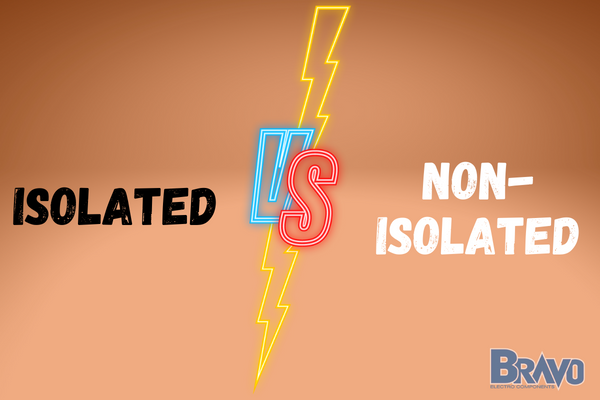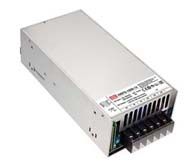
Choosing the right power supply types is not something that can be taken lightly no matter the application. We see our customers struggle with picking between an isolated vs non-isolated power supply time and time again. So, we’ll break down the differences below to leave you with complete clarity.
Isolated power supplies are safer, quieter, and capable of providing multiple output voltages since they provide electrical separation between input and output. On the other hand, non-isolated power supplies are smaller, more affordable, and great when electrical isolation isn’t essential.
Here’s a chart showing which makes sense for you between an isolated and non-isolated PSU:
| Factor | Isolated Power Supply | Non-Isolated Power Supply |
|---|---|---|
| Applications | Medical devices, industrial automation, avionics, high-voltage power conversion, sensitive measurement equipment. | Consumer electronics, automotive applications, battery-powered devices, embedded systems. |
| Safety & Compliance | Required for high-risk applications to prevent electrical shock and ensure regulatory compliance. | Sufficient for low-risk applications where isolation is unnecessary. |
| Cost | Higher due to transformers and additional safety components. | Lower due to a simpler design without isolation components. |
| Size & Weight | Larger and heavier due to isolation components. | More compact and lightweight, making it ideal for space-constrained designs. |
| Efficiency | Lower efficiency due to energy losses in the isolation transformer. | Higher efficiency as there are no transformer-related losses. |
| Noise & Interference | Minimizes electrical noise and ground loops, providing cleaner power for sensitive equipment. | More susceptible to noise, requiring additional filtering in some applications. |
| Reliability & Durability | More robust in high-voltage and high-risk environments. | Reliable for low-voltage applications but may need external protection in certain conditions. |
Learn more below or get in touch with our team here at Bravo Electro for one-on-one assistance navigating the nuances between isolated vs non-isolated power supply.
What is an Isolated Power Supply?
Isolated power sources are built to provide electrical separation between their input and output. A transformer is utilized in this design which produces a barrier between the two circuits, meaning there is no direct connection.
- Enhanced safety: Electrical insulation mitigates the risk of electric shock or equipment damage from voltage fluctuations and ground loops in scenarios with strict safety standards, such as medical gadgets or industrial control processes.
- Noise reduction: Insulating the input and output circuits helps reduce electrical noise and interference. This is especially important in applications where signal consistency and precise data transmission is crucial, including communication devices or precise measurement apparatus.
- Multiple output voltages: Isolated power supplies can provide multiple, independent output voltages, making them suitable as both high-voltage power supplies or lower-voltage power supplies for applications requiring various voltage levels.
This configuration is especially useful in medical applications, industrial control systems, and sensitive communication devices where electrical isolation is critical. They particularly offer protection against electrical shock and reduce the risk of damage caused by power supply voltage spikes or ground loops.
What is a Non-Isolated Power Supply?
Contrary to isolated power supplies, non-isolated power sources do not generate electricity that is divided between the input and output circuits. Here are some reasons you might want to choose this type:
- Cost-effectiveness: Non-isolated power supplies are often cheaper than isolated ones. Design simplicity means fewer components, translating to lower assembly costs.
- Compact size and weight: Their reduced power supply size and weight can be especially important in portable devices or applications where space is at a premium.
- Efficiency: Non-isolated power supplies generally offer higher PSU efficiency ratings compared to isolated power supplies, as they do not require a transformer. Higher efficiency can lead to reduced energy consumption and lower operating temperatures.
Although non-isolated power supplies have their advantages, they’re not ideal for applications in need of exact adherence to power supply safety standards or protection against static and disturbances.
Common Applications for Isolated vs Non-Isolated Power Supply
Still not sure whether an isolated vs non-isolated power supply is right for you? You can narrow it down based on the optimal use case below:
Medical Equipment
Safety is essential in medical environments. Isolated power supplies are usually preferred because of their capability to provide electrical insulation, reducing the danger of electric shock or harm to delicate instruments.
This amplified safety is especially important when dealing with life-sustaining devices or those that come into direct contact with patients.
Industrial Control Systems
Electrical noise and interference are common problems in industrial settings. Isolated power supplies can protect vulnerable equipment from these interruptions, making them suitable for industrial control systems.
By diminishing the hazard of equipment damage and ensuring precise data transmission, these types of power supplies can help enhance the dependability and effectiveness of industrial operations.
Consumer Electronics
Non-isolated power supplies are typically used in consumer electronics, such as smartphones and laptops, due to their small size, cost-efficiency, and adequate performance for most applications.
In these cases, electrical insulation might not be a critical demand, and the advantages of non-isolated power supplies, like reduced size and weight, can take precedence over those of isolated power supplies.
Automotive Systems
Non-isolated power supplies are usually seen in automotive applications because of their compact shape and value for money.
These power supplies can provide necessary voltage regulation and conversion for all sorts of electronic components found within vehicles, including infotainment systems, lights, and engine control modules.
However, certain scenarios may need isolated power supplies for safety-critical systems or to reduce electrical noise in delicate parts.
While technically not an automotive system, it’s worth noting that aircraft need isolated power supplies since a ground connection is impossible. They rely on floating outputs, and isolated PSUs support this.
How Do I Know if I Have an Isolated or Non-Isolated Power Supply?
Maybe you’re seeing the bad power supply symptoms and are preparing for replacement, but don’t know for sure if you currently have an isolated or non-isolated power supply. There are a few ways you can distinguish between the two:
- Voltage: The simplest method is to check the voltage by placing a value resistor between input and output points. An isolated PSU will not register any voltage.
- Schematics: Hopefully you still have the schematics on hand for your PSU as this information will clue you into exactly what you’re working with.
- Visual Inspection: There are a few other indicators you may have an isolated PSU, like a double square icon which suggests the device is double insulated (isolated). Or, you can read the packaging for shock warnings or protective plastic housings. These are indicative of a non-isolated PSU.
But sometimes, there’s not way to know for sure what you’re working with. In these cases, we recommend you assume the device is non-isolated for safety purposes. Or, better yet, get in touch with our team at Bravo Electro!
When in Doubt, Reach Out!
Ultimately, the choice between an isolated vs non-isolated power supply will depend on your specific application and its requirements. Take safety, electrical noise, space limitations, and cost into account.
If you are still unsure about which type of power supply is best for your needs, just reach out to the professionals at Bravo Electro for advice. We're dedicated to helping you find the perfect power supply solution for your unique application.
Our team of experts can guide you through the process of selecting the right AC DC power supplies, ensuring your project's success - even if that means you need a custom power supply.
Our power supply requirements form helps people get tailored advice on finding a fitting solution. To guarantee the best quality, we source all power supplies only from trusted names in the industry like Meanwell.
Our electrical engineering team is always here to help with technical stuff and answer any questions about power supplies. Discover a diverse range of power supplies to suit various needs, including:
- Enclosed Power Supply: Ideal for industrial and commercial environments, providing protection and durability.
- Open Frame Power Supply: Compact and lightweight, perfect for space-constrained applications. Check out our guide that compares open frame vs enclosed power supply.
- Modular Power Supply: Easy to customize and configure, making them a great choice for custom projects.
- LED Driver Power Supply: Specifically designed for LED lighting applications.
Whether you need 12v DC power supplies, a 24v DC power supply, or a 48v DC power supply, we have it all! These are just a few of the options we provide to cater to your specific power supply requirements.
Final Words on Isolated vs Non-Isolated Power Supply
To sum it up, the choice between isolated vs non-isolated power supplies depends on your application's specific needs. Take into account safety, electrical noise, space restrictions, and cost when making this decision.
For any inquiries or professional advice, don't hesitate to contact our team at Bravo Electro. We pride ourselves on delivering the highest customer service and unparalleled electrical components for your projects.







